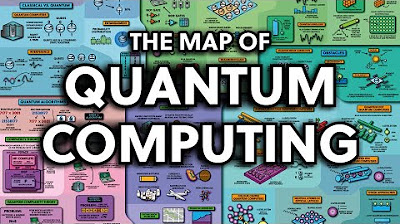క్వాంటం సైన్స్ తో కంప్యూటర్ విప్లవం ఎలా ? || Computer Revoluation With Quantam Science ||
Summary
TLDRThe transcript explores the evolution of computing, comparing classical and quantum computing. It explains how conventional computers use binary digits (bits) for processing and the limitations of this system. Quantum computing, in contrast, uses quantum bits (qubits) that can exist in multiple states, offering much greater processing power. The discussion delves into quantum mechanics principles like superposition, the miniaturization of matter, and the potential of quantum computing to revolutionize technology. The complexities and potential applications of quantum computing are explored, along with the concept of atomic-level computing and the importance of quantum properties.
Takeaways
- 😀 Quantum computers are significantly faster than current supercomputers, operating on a level beyond traditional computing capabilities.
- 😀 Conventional computers use binary digits (0s and 1s), known as bits, to process information. These are represented as electrical signals in the circuitry.
- 😀 Binary numbers (base-2 system) can represent any number, but computers can only interpret zeros and ones as on/off states.
- 😀 A byte consists of 8 bits (0s and 1s), which can be combined in 256 possible ways, forming the basic unit of information storage.
- 😀 Conventional computing uses binary digits, but quantum computing uses quantum bits (qubits), which can exist in multiple states simultaneously due to superposition.
- 😀 In quantum computing, atoms and subatomic particles are manipulated at the atomic level, offering the potential for extreme miniaturization and faster processing.
- 😀 Quantum mechanics introduces two primary states for particles: 'up' or 'down', which can represent binary states (1 and 0) for qubits.
- 😀 Quantum computing's power lies in the manipulation of quantum states using laser pulses, which change the orientation of particles, enabling much faster processing.
- 😀 Quantum computing benefits from the principle of superposition, where qubits can exist in multiple states at once, vastly expanding the number of calculations possible.
- 😀 Technologies like auto-second technology and the ability to manipulate particles at extremely small scales contribute to quantum computing's potential to perform operations far beyond conventional hardware capabilities.
Q & A
What is quantum computing, and how does it differ from conventional computing?
-Quantum computing leverages the principles of quantum mechanics to process information. Unlike conventional computers that use binary systems (0s and 1s), quantum computers use quantum bits (qubits) which can exist in multiple states simultaneously, allowing them to solve certain problems much faster.
What is the main difference between classical computing and quantum computing in terms of data representation?
-In classical computing, data is represented in binary form, using bits that are either 0 or 1. Quantum computing, on the other hand, uses qubits which can represent both 0 and 1 simultaneously through superposition, enabling more complex computations.
What is a qubit, and how does it function differently from a classical bit?
-A qubit is the basic unit of information in quantum computing. Unlike classical bits that can only be in one state (either 0 or 1), qubits can exist in multiple states simultaneously due to superposition. This allows quantum computers to perform many calculations in parallel.
How do the concepts of superposition and entanglement contribute to quantum computing?
-Superposition allows qubits to exist in multiple states at once, while entanglement connects qubits in such a way that the state of one qubit can affect the state of another, even at a distance. These principles enable quantum computers to process complex problems more efficiently than classical computers.
Why is miniaturization significant in quantum computing?
-Miniaturization is important in quantum computing because quantum properties, like superposition and entanglement, operate at the atomic level. The smaller the components, the easier it is to manipulate these properties for faster and more efficient computations.
What does the concept of 'quantum bits' mean in relation to quantum mechanics?
-Quantum bits, or qubits, are the quantum mechanical counterpart to classical bits. They exploit the quantum mechanical properties of particles, such as spin and superposition, to perform computations in ways that classical bits cannot, allowing for much greater computational power.
What role does laser manipulation play in quantum computing?
-Lasers are used to manipulate the states of quantum particles (like qubits). By sending pulses of light, quantum states can be changed, enabling the processing of information at quantum speeds and helping to control the superposition and entanglement of qubits.
How does quantum computing affect traditional data processing speeds?
-Quantum computing can drastically improve data processing speeds by performing calculations in parallel and utilizing quantum properties like superposition and entanglement. This could potentially allow quantum computers to solve problems that would take classical computers an impractical amount of time.
What is the significance of the auto-second technology mentioned in relation to quantum mechanics?
-Auto-second technology refers to time intervals shorter than a second, measured in billionths of a second. In quantum mechanics, processes such as atomic transitions can occur within these ultra-short timescales, enabling quantum computers to perform computations at incredibly fast rates.
How does quantum computing challenge our current understanding of computing?
-Quantum computing challenges current computing models by introducing new ways of processing information that are not based on binary logic. This opens up new possibilities in fields like cryptography, optimization, and complex simulations, which were previously impossible or highly impractical to perform with classical computers.
Outlines

このセクションは有料ユーザー限定です。 アクセスするには、アップグレードをお願いします。
今すぐアップグレードMindmap

このセクションは有料ユーザー限定です。 アクセスするには、アップグレードをお願いします。
今すぐアップグレードKeywords

このセクションは有料ユーザー限定です。 アクセスするには、アップグレードをお願いします。
今すぐアップグレードHighlights

このセクションは有料ユーザー限定です。 アクセスするには、アップグレードをお願いします。
今すぐアップグレードTranscripts

このセクションは有料ユーザー限定です。 アクセスするには、アップグレードをお願いします。
今すぐアップグレード関連動画をさらに表示

What Is Quantum Computing? | April 2, 2025

Computação Quântica - Fundamentos e Aplicações - Aula 07

Rigetti’s Vision for the Future of Quantum Computing: What Makes This Company So Special?

Your Guide to 100+ Qubits: Quantum Computing in Practice

The Map of Quantum Computing - Quantum Computing Explained

What Is Quantum Computing? | Quick Learner
5.0 / 5 (0 votes)
